Theatre Conspiracy’s ‘Ma Rainey’s Black Bottom’ brilliantly written, thoughtfully directed, powerfully performed
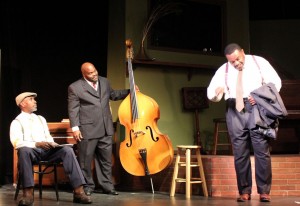 Theatre Conspiracy’s production of August Wilson’s Ma Rainey’s Black Bottom opened in the Alliance’s Foulds Theatre to a sold-out crowd on February 24. While the characters in the 1927 Chicago recording studio set on the Foulds Theatre stage talk about jazz, racism and the scales of justice and power, the story is an unvarnished, bareknuckle psychodrama about the way these and
Theatre Conspiracy’s production of August Wilson’s Ma Rainey’s Black Bottom opened in the Alliance’s Foulds Theatre to a sold-out crowd on February 24. While the characters in the 1927 Chicago recording studio set on the Foulds Theatre stage talk about jazz, racism and the scales of justice and power, the story is an unvarnished, bareknuckle psychodrama about the way these and 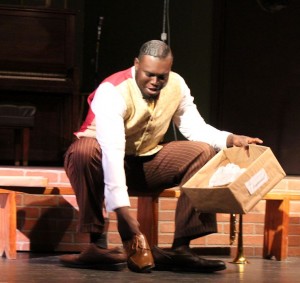 other influences shaped the lives of the singer her four-man band.
other influences shaped the lives of the singer her four-man band.
In spite of the title, the play’s not really about blues singer Gertrude Ma Rainey. In fact, she’s late to the recording session and does not make an appearance until well into the middle of Act One. That’s fine. It gives the audience time to get familiar with the boys in the band – Cutler (Curt Sheard), the dignified trombone player who leads the band (“and one, and two, and you know what to do”); 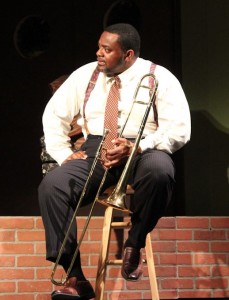 Toledo (Elvis Mortley), a wizened piano player who laments that blacks have forsaken their African heritage in their unexamined effort to become white; Slow Drag (Cicero McCarter III), an unassuming bassist so content with his life that he’d just as soon dance with a girl in Fat Back, Arkansas as a lady in New Orleans; and Levee (Roosevelt Stewart), a cocksure trumpet player with big aspirations, new shoes and an even bigger attitude.
Toledo (Elvis Mortley), a wizened piano player who laments that blacks have forsaken their African heritage in their unexamined effort to become white; Slow Drag (Cicero McCarter III), an unassuming bassist so content with his life that he’d just as soon dance with a girl in Fat Back, Arkansas as a lady in New Orleans; and Levee (Roosevelt Stewart), a cocksure trumpet player with big aspirations, new shoes and an even bigger attitude.
As a playwright, August Wilson is coy. He allows each character’s personality to emerge organically from the banter, razzing, well-worn jokes, conflicts and lamentations they share in the spare, 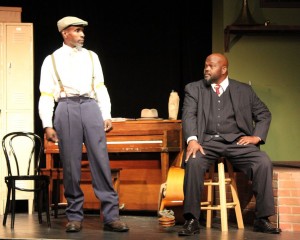 locker room that subs as their warm-up space in the recording studio’s basement. Sheard, McCarter, Mortley and Stewart understand their characters and what Wilson is doing here so completely that the audience quickly develops an affinity for each of the musicians. But each of the boys has a story to tell, and within no time their raw, existential essence bubbles to the surface.
locker room that subs as their warm-up space in the recording studio’s basement. Sheard, McCarter, Mortley and Stewart understand their characters and what Wilson is doing here so completely that the audience quickly develops an affinity for each of the musicians. But each of the boys has a story to tell, and within no time their raw, existential essence bubbles to the surface.
“White folks don’t understand about the blues,” 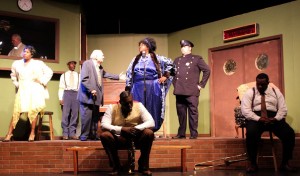 Ma tells Cutler during a lull in the recording session some time later. “They hear it come out, but they don’t know how it got there. They don’t understand that’s life way of talking. You don’t sing to feel better. You sing ’cause that’s a way of understanding life.”
Ma tells Cutler during a lull in the recording session some time later. “They hear it come out, but they don’t know how it got there. They don’t understand that’s life way of talking. You don’t sing to feel better. You sing ’cause that’s a way of understanding life.”
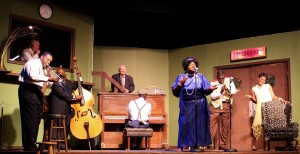 Ma and her band members don’t just play the blues. They live ‘em. Their existence is absurd. Each is controlled by forces greater than themselves, forces that rob them of freedom of choice and the ability to make their lives meaningful. They were born by chance and will die by chance.
Ma and her band members don’t just play the blues. They live ‘em. Their existence is absurd. Each is controlled by forces greater than themselves, forces that rob them of freedom of choice and the ability to make their lives meaningful. They were born by chance and will die by chance. 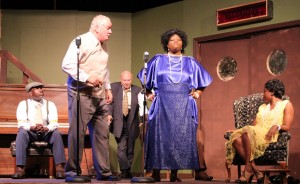 In between, they can only hope for fleeting moments of fun, laughter and happiness.
In between, they can only hope for fleeting moments of fun, laughter and happiness.
And it’s Ma Rainey who’s the metaphorical stand-in for this cultural reality. Cantrella Canady is spectacular in the role of the Mother of the Blues. She blusters and makes demands that send her manager (Charlie Sloin) and record producer (Patrick Day) 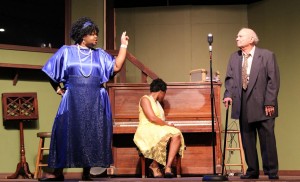 scurrying about – fixing her car which has been dented in a fender bender, paying off a cop who wants to arrest Ma because of the ensuing scuffle with a white cabbie who refused to take her to the recording studio, turning up the heat, and running to the deli for a Coca Cola if they expect her to sing a note. She torments Irvin and Sturdyvant not because she’s a diva, but as
scurrying about – fixing her car which has been dented in a fender bender, paying off a cop who wants to arrest Ma because of the ensuing scuffle with a white cabbie who refused to take her to the recording studio, turning up the heat, and running to the deli for a Coca Cola if they expect her to sing a note. She torments Irvin and Sturdyvant not because she’s a diva, but as 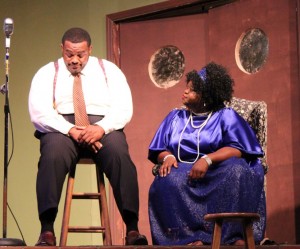 revenge for the fact that in reality they control her life and music.
revenge for the fact that in reality they control her life and music.
“As soon as they get my voice down on them recording machines, then it’s just like if I’d be some whore and they roll over and put their pants on,” she acknowledges to Cutler. Her victories are inconsequential – having her nephew, a stutterer, do the introduction to “Black Bottom” and 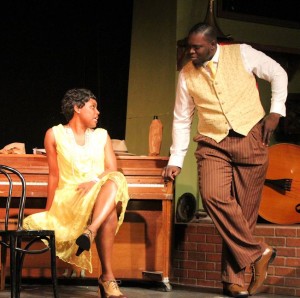 insisting that the producer pay him $25 for the gig. Although it isn’t mentioned during the play, Rainey got a scant $200 per record at a time when Al Joelson was being paid $10,000 a performance to sing in black face!
insisting that the producer pay him $25 for the gig. Although it isn’t mentioned during the play, Rainey got a scant $200 per record at a time when Al Joelson was being paid $10,000 a performance to sing in black face!
But there is one person who’s determined to take life by the throat and gain some power over the course his life will take, even if that means selling his soul to the devil, and that’s Levee. He’s created a jazzier, more modern version of “Black Bottom” that reflects the latest trends in jazz. He’s written 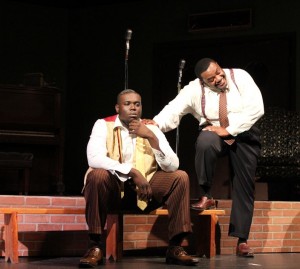 some songs that the money-grubbing producer, Sturdyvant, has promised to record. And he’s forming a band that will be his ticket to fame and fortune.
some songs that the money-grubbing producer, Sturdyvant, has promised to record. And he’s forming a band that will be his ticket to fame and fortune.
“I ain’t like you,” he tells Cutler. “I got talent.”
But in 1927, sheer talent and bravura wasn’t enough to enable a black artist to overcome adversity. Levee soon discovers that Ma won’t use his version of her song. In fact, she won’t even 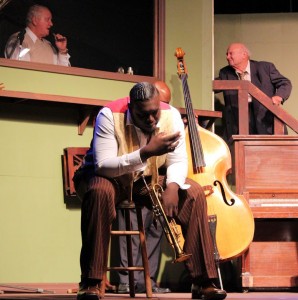 tolerate his presence in her band any longer. And the white producer on whom he’d pinned his hopes stuffs a couple of Lincolns in his hand as he tells him that his songs are not right for the record label but he’ll do him a favor by taking them off his hands.
tolerate his presence in her band any longer. And the white producer on whom he’d pinned his hopes stuffs a couple of Lincolns in his hand as he tells him that his songs are not right for the record label but he’ll do him a favor by taking them off his hands.
As he did in childhood, Levee responds to powerlessness with rage and violence, and it’s worth the price of admission to watch Roosevelt Stewart morph from hopeful to unhinged. Funny, droll and understated early on, Stewart explodes with angst and 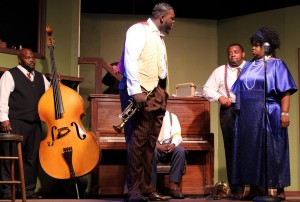 fury as Levee’s story unfolds. His frothing diatribe challenging God to strike him down and ensuing fisticuffs and knife fight with Cutler will have your pulse pounding and hands shaking.
fury as Levee’s story unfolds. His frothing diatribe challenging God to strike him down and ensuing fisticuffs and knife fight with Cutler will have your pulse pounding and hands shaking.
While “Ma Rainey’s Black Bottom” is a reflection of African American history, culture and identity 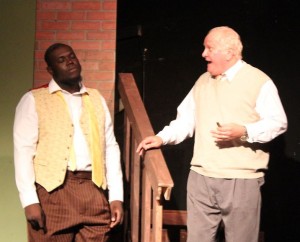 during the Roaring Twenties, it is first and foremost a very personal and all-too-tragic story of four musicians and a singer who come together on an ill-fated afternoon in Chicago to record some music. But the story written so brilliantly, directed so thoughtfully and performed so powerfully that you’ll be running for some of Slow Drag’s bourbon or Cutler’s reefer (for medicinal purposes only) to settle your nerves as you deconstruct what you just
during the Roaring Twenties, it is first and foremost a very personal and all-too-tragic story of four musicians and a singer who come together on an ill-fated afternoon in Chicago to record some music. But the story written so brilliantly, directed so thoughtfully and performed so powerfully that you’ll be running for some of Slow Drag’s bourbon or Cutler’s reefer (for medicinal purposes only) to settle your nerves as you deconstruct what you just 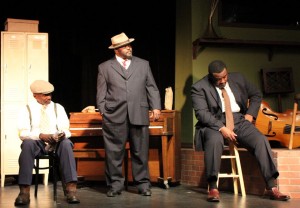 experienced.
experienced.
August 24, 2107.
RELATED POSTS.
- With ‘Ma Rainey’s Black Bottom,’ Theatre Conspiracy takes us into world of 1920s black Blues musicians
- Use of the n’word in ‘Ma Rainey’s Black Bottom’
- Cantrella Canady is Ma Rainey in new
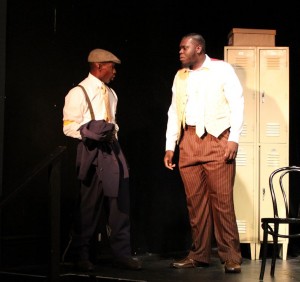 Theatre Conspiracy play
Theatre Conspiracy play - Cicero McCarter is Slow Drag in ‘Ma Rainey’s Black Bottom’
- Elvis Mortley is piano man Toledo in ‘Ma Rainey’s Black Bottom’
- Patrick Day is music producer Sturdyvant in ‘Ma Rainey’s Black Bottom’
- ‘Ma Rainey’ play dates, times and ticket information














 Tom Hall is both an amateur artist and aspiring novelist who writes art quest thrillers. He is in the final stages of completing his debut novel titled "Art Detective," a story that fictionalizes the discovery of the fabled billion-dollar Impressionist collection of Parisian art dealer Josse Bernheim-Jeune, thought by many to have perished during World War II when the collection's hiding place, Castle de Rastignac in southern France, was destroyed by the Wehrmacht in reprisal for attacks made by members of the Resistance operating in the area. A former tax attorney, Tom holds a bachelor's degree as well as both a juris doctorate and masters of laws in taxation from the University of Florida. Tom lives in Estero, Florida with his fiancee, Connie, and their four cats.
Tom Hall is both an amateur artist and aspiring novelist who writes art quest thrillers. He is in the final stages of completing his debut novel titled "Art Detective," a story that fictionalizes the discovery of the fabled billion-dollar Impressionist collection of Parisian art dealer Josse Bernheim-Jeune, thought by many to have perished during World War II when the collection's hiding place, Castle de Rastignac in southern France, was destroyed by the Wehrmacht in reprisal for attacks made by members of the Resistance operating in the area. A former tax attorney, Tom holds a bachelor's degree as well as both a juris doctorate and masters of laws in taxation from the University of Florida. Tom lives in Estero, Florida with his fiancee, Connie, and their four cats.